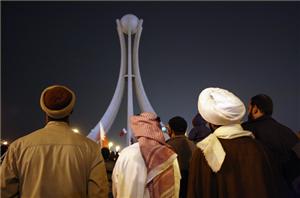“The peaceful demonstrations in Bahrain are among the domestic issues of this country, and creating an atmosphere of fear and using other countries’ military forces to oppress these demands is not the solution,”

Bahrain’s king has declared a three-month state of emergency Tuesday, in response to weeks of anti-government protests. The order, which takes immediate effect, comes one day after Saudi troops entered the country to help quell unrest.
Bahrain declared martial law on Tuesday, looking to end weeks of protests by the island’s Shi’ite Muslim majority, with Saudi troops on hand in the Sunni-ruled kingdom to help quell the unrest.
The three-month state of emergency will hand considerable powers to Bahrain’s security forces, which are dominated by the country’s Sunni elite, stoking sectarian tensions in one of the Gulf’s most politically volatile nations.
In a sign of continued disturbances on the island, an opposition politician said a Bahraini man was killed in clashes with police in the Shi’ite Muslim area of Sitra and several others were wounded.
Bahrain TV said the king had “authorized the commander of Bahrain’s defense forces to take all necessary measures to protect the safety of the country and its citizens”.
SPOTLIGHT: SAUDI TROOPS ARRIVE IN BAHRAIN
“This is the first cross-border military operation since the Arab uprisings started”
It was not clear if a curfew would be imposed or whether there would be any clampdown on media or public gathering.
On Monday, more than 1,000 Saudi troops rolled into the kingdom in a long convoy of armored vehicles at the request of Bahrain’s Sunni rulers, flashing victory signs as they crossed the causeway that connects the two oil producers.
The United Arab Emirates said it also would send 500 police.
Analysts saw the troop movement into Bahrain, home to the U.S. Navy’s Fifth Fleet, as a mark of concern in Saudi Arabia that concessions by the country’s monarchy could inspire the conservative Sunni-ruled kingdom’s own Shi’ite minority.
Over 60 percent of Bahrainis are Shi’ites who complain of discrimination at the hands of the Sunni royal family. Calls for the overthrow of the monarchy have alarmed the Sunni minority, which fears that unrest could serve non-Arab Shi’ite power Iran.
Iran, which sits across the Gulf from Bahrain, sharply criticized the Saudi intervention.
“The presence of foreign forces and interference in Bahrain’s internal affairs is unacceptable and will further complicate the issue,” Foreign Ministry spokesman Ramin Mehmanparast said at his weekly news conference in Tehran.
A Bahraini foreign ministry official called the remarks a “blatant interference in Bahrain’s internal affairs,” the state news agency BNA said, adding that Manama had recalled its ambassador to Iran for consultations.

